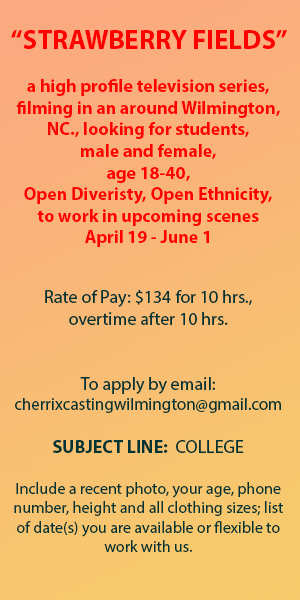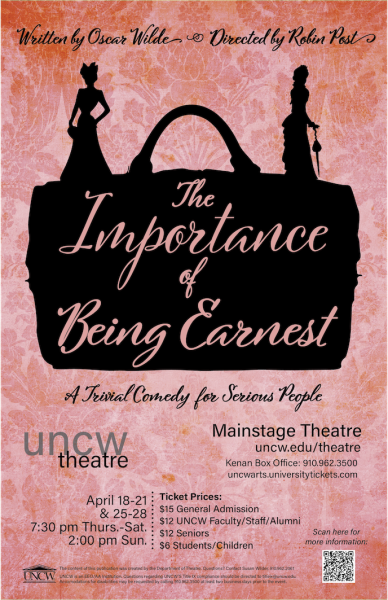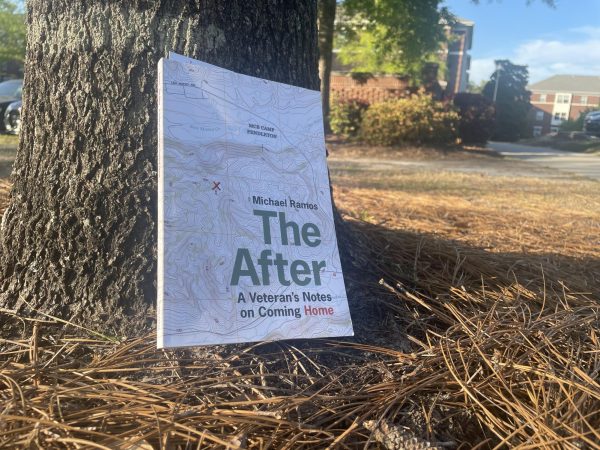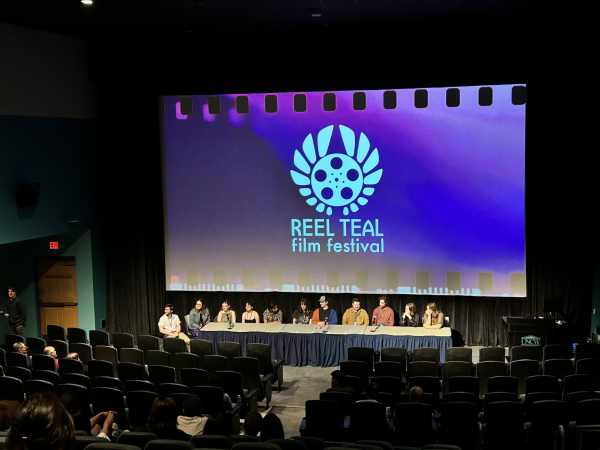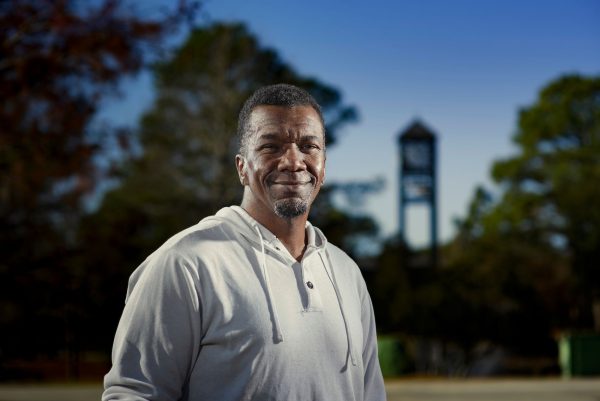Mutemath gives ethereal performance
September 21, 2011
Mutemath makes playing God look easy, however, church-like is the last thing anyone thinks of when they are at The Soapbox.
The Soapbox is Wilmington’s version of that dive-bar-meets-club every city has. The walls that aren’t covered in old tour posters are in various states of repaint. Chlorine and stale beer make the air sweetly toxic, glitter permanently stains the floor, and it’s dank because it can be. But for one night, four men from Louisiana made the Soapbox their own little piece of heaven. Droves of UNCW students came out to witness Mutemath’s first go at transubstantiation in downtown Wilmington.
Alternative rock enthusiasts attended the concert last Tuesday in anticipation of both a memorable Mutemath performance as well as for an early listen to new tracks from the band’s latest album, “Odd Soul.” Everyone from skateboard-toting high school juniors to middle-aged math teacher look-a-likes were present. UNCW students attended, making up a large portion of the 21-and-over crowd.
Junior Luke Brown was there with a few friends. “It’s going to be a really good show,” said Brown. He was excited for the performance, saying it was “going to be incredible because I’ve heard [Mutemath] puts on some of the best shows.” Brown’s friends were of the same mind, commenting on how packed The Soapbox was. “I expected it to be a packed show, and it definitely is. It’s going to be good,” Brown said.
The same enthusiasm was obvious among the crowd as they waited an extra 45 minutes for the show to start.
Despite so much recent success, the New Orleans-based band was born to humble beginnings. In the early 2000’s, Paul Meany’s Christian rock band, Earthsuit, was slowly waning. In spite of this, the lead vocalist/keyboardist was collaborating long-distance with drummer Darren King of Missouri.
When Earthsuit finally petered out in 2002, Meany and King’s side projects became the basis for a new group, Mutemath, eventually producing the hit “Typical.” (The music video for this early piece got the band a Grammy nod in 2007.) After King moved to New Orleans, Roy Mitchell-Cárdenas, the Earthsuit bassist, returned from a school hiatus to try it in the music business once more.
If the combination of a forties CV-organ from a church in New Orleans and modern synthesizers is any inclination, Mutemath has evolved into a very unique group. The fact that they are all-inclusive when it comes to percussion instruments—”We were all drummers at one point,” affirmed King—brings another element to their songs.
In the dim glow of smoke and blue light, Meany’s organ raised goose bumps throughout the Soapbox crowd. During the performance, he played popular hits “Control” and “You are Mine” that most audience members had only heard as they were recorded—with a keyboard. The distinct sounds of the organ went right to the soul of every audience member.
This soulfulness speaks to the new direction Mutemath is taking with their third album, “Odd Soul,” which will be released Oct. 4. “We wanted something wild,” said King.
After noticeable self-doubt on their sophomore album, “Armistice” (2008), the band wanted something more liberated and personal. They turned to seventies rock, James Brown, and the Blues—”Black American music”—for inspiration.
“We also gained inspiration from our live album. Once we realized we sounded better live, we knew that was the sound we wanted for this new album,” King said.
The guys knew it was time to do something drastic to bring the vitality back to their music. “So Paul [Meany] called the record label and told them: pretend like you just dropped us,” King recalled. According to King, this allowed the band to take a step back and find Mutemath again, not some idea of what Mutemath should be.
Lyrically, “Odd Soul” is more personal—it takes place in their lives. Despite the fact that most of the band members are married and in their thirties, when King explained the writing process for this album, his words spoke to many of the challenges UNCW students are facing right now.
Writing lyrics became an exploration of their lives, “Which parts to keep or throw away…and how to balance disappointments with hope” as they mature. It is this depth and understanding of life that comes through in this latest album.
Darren King learned a lot about life from his childhood. He came from a small town in Missouri where he went to a charismatic church. Incidentally this church and its revivalist services led to King’s love for music and the drums. It also led him on a quest to imitate Jesus Christ. It’s not every day that you hear a drummer in a rock band state that as a high school student he was going to “save” his entire school.
“You can only try to be Jesus for so long before you really blow a gasket,” King said, laughing at his failed attempt.
This is a lesson everyone faces at some point or another: to accept failure and move on or dwell on it. Mutemath’s single, “Blood Pressure” speaks to this exact dilemma.
Mutemath’s Odd Soul Introduction Tour is also meant to serve a psychological purpose for the band. Surprisingly, “The Soapbox is the biggest venue we’ve played so far,” according to Scott Cannon, the band’s assistant tour manager. “All the venues are small clubs specifically, so that the band can take a step back and start over in order to get back to how it was when they were first starting out,” said Cannon. “They want to feel the crowd and the sweat.”
But sweat is not what most people will remember when they look back on Tuesday night’s show. They will remember four men coming in through the crowd like a New Orleans street band, their percussion rhythms rattling the floorboards.
After that, they will recall fog and crystal blue light opening up the claustrophobic space that was The Soapbox, now resembling the inside of a cloud.
The air itself seemed to hum with life as Meany’s organ crooned up the spines of the audience members. King’s drumming was impossible to resist, and before anyone realized it, the entire audience was moving, as if in a trance.
Heads bobbing, feet tapping, sounds filling their stomachs, every sense attuned to the sounds radiating from the stage.
The audience tasted the sadly sweet lyrics of “You are Mine,” as their eyes fell half-mast, or closed, dazzled as they were by the lofty blue lights, the same blue lights backlighting Mutemath like the music gods they are.
As they recall the entire sensory experience—goose bumps, hypnotic sounds, dazzled eyes, and a mouth full of soul-filled mantra—there will be no doubt in any attendee’s mind: the members of Mutemath won’t be blowing any gaskets any time soon. They will be playing God for a long time.












